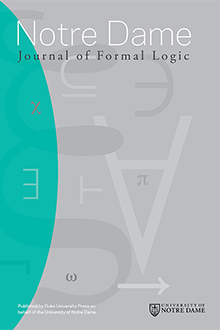Abstract
In the study of nonmonotonic reasoning the main emphasis has been on static (declarative) aspects. Only recently has there been interest in the dynamic aspects of reasoning processes, particularly in artificial intelligence. We study the dynamics of reasoning processes by using a temporal logic to specify them and to reason about their properties, just as is common in theoretical computer science. This logic is composed of a base temporal epistemic logic with a preference relation on models, and an associated nonmonotonic inference relation, in the style of Shoham, to account for the nonmonotonicity. We present an axiomatic proof system for the base logic and study decidability and complexity for both the base logic and the nonmonotonic inference relation based on it. Then we look at an interesting class of formulas, prove a representation result for it, and provide a link with the rule of monotonicity.
Citation
Joeri Engelfriet. "Minimal Temporal Epistemic Logic." Notre Dame J. Formal Logic 37 (2) 233 - 259, Spring 1996. https://doi.org/10.1305/ndjfl/1040046088
Information





